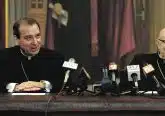The Catholic Moment: Has the Transfiguration transfigured you?
Wednesday, August 5, 2009
By Scott Mussari
Every year on August 6, the Catholic church celebrates the feast of the Transfiguration of the Lord. The significance of this particular event with regards to our religion is apparent in numerous ways.
Number one, for example, is the initial recorded recognition and celebration of the Transfiguration that dates back to the fifth century to monks from the east. Two is how the observance of its occurrence spread and became officially inserted into the church’s general calendar by Pope Callistus III in 1457. Three is how in 2002 Pope John Paul II selected the Transfiguration as the fourth of the five latest luminous mysteries of the rosary. Four is the fact it is recorded in three Gospels and how we rotate and read a version each cycle on the second Sunday of Lent.
These are merely a few of the many reasons illustrating the magnitude of this feast to Catholicism collectively. Perhaps the more pressing point is what this means to us individually? In other words, how relevant is it in our daily living?
The Transfiguration begins with Jesus inviting Peter, James and John up to a mountaintop. Even from this first moment of the episode, we are challenged to apply the scene to ourselves. Just as Jesus withdraws with His earthly friends, we are encouraged to reflect on how regularly we take time from the busyness of our everyday to purposely pursue and seek out our heavenly friend.
The story continues with Elijah and Moses suddenly appearing among them. Their presence represents the prophecy and the laws of the Old Testament respectively, and gives credence to Jesus as the fulfillment of what the Scriptures foretell. What it tells us today is to consider the amount of time and effort we exert to study and learn God’s message in the Bible. In addition, we can contemplate how readily we accept and abide in or how easily we reject and refuse the laws and doctrines of our religion.
The narrative proceeds with Peter offering to build tents to the honored guests. He felt compelled to do something grandiose. In great contrast though, God’s response was merely for him to listen. For Peter and for us, slowing down and stopping to hear the holy is a simple task, yet often can be difficult to actually accomplish. Quieting ourselves and listening for divine direction and guidance can be daunting due to what we could discover is being said.
As the Transfiguration account affirms, the essence of what God is confirming is the very nature of Christ. It is revealed to the three apostles and to us that Jesus is God’s beloved son. He is fully human and fully divine and has the full authority of God. Jesus is whom we are to devote our existence to. This is why the apostles traveled back down. We too are to follow Jesus from the mountaintops into our families, neighborhoods, workplaces and everywhere we encounter others. With religion there must be times for solitude, however this does not mean we are to be constantly solitary. We ought to reflect and discern our mission and calling, while carrying out the work among and with our sisters and brothers.
The revelation of the Transfiguration is that it is not only Jesus who must take up the cross, but that the apostles and each one of us must do likewise. The wonderful and at times overwhelming responsibility of being a follower of Christ means accepting the truth and embracing everything it entails. It means to agree each day to sacrifice to help others, to be kind, to serve, to speak out against injustices, to speak up for Catholicism and to be disciplined in our prayer habits. These are the ways we live out the symbol of our convictions and the means by which it symbolizes what we believe.
The Transfiguration is not a single event to be thought about and then forgotten. Rather it is an ongoing process of metamorphosis of who we are. It is not random chance this feast was placed 40 days prior to the feast of the Triumph of the Cross as a sort of second Lent of the year. It is an opportunity for the faithful to focus on how the physically blinding light of the Transfiguration can transform us spiritually so we might brighten and share this light throughout our world.
Scott Mussari is the director of faith formation at St. Columban Church in Loveland and can be reached at [email protected]













